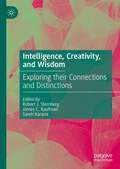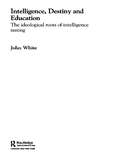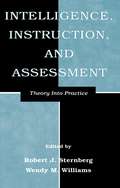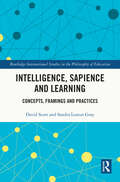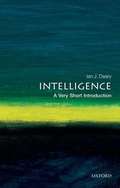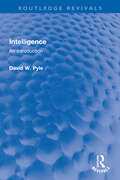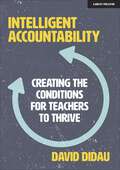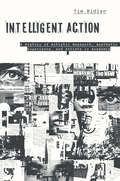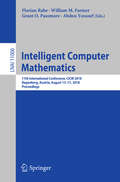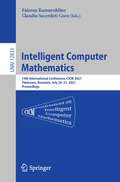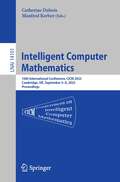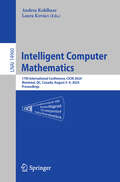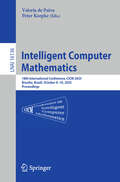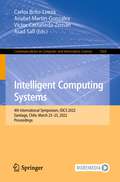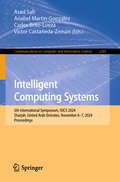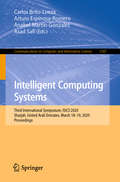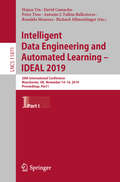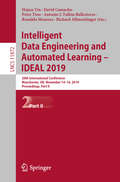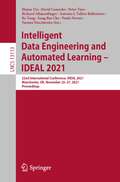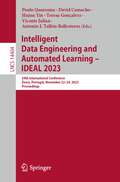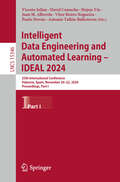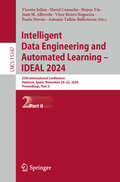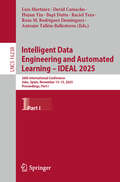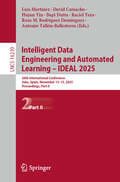- Table View
- List View
Intelligence, Creativity, and Wisdom: Exploring their Connections and Distinctions
by Robert J. Sternberg James C. Kaufman Sareh KaramiThis edited collection examines the interrelationships between the psychological concepts of intelligence, creativity, and wisdom, while also presenting a systematic attempt to combine them within the overarching concept of meta-intelligence. Building on Robert J. Sternberg’s previous work, this authoritative volume brings together leading researchers in the field of intelligence, creativity, and wisdom to show the latest advances in this line of research through a selection of 18 chapters. Using a wide range or approaches, including psychological, cognitive, educational, and philosophical perspectives, internationally renowned scholars offer insights into the benefits of re-thinking our understanding of intelligence, creativity, and wisdom, and how they may helpfully be more integrated.This wide-ranging collection will appeal in particular to students and scholars of cognitive, differential, social, developmental, and educational psychology, as well as creativity studies, education, philosophy, and related disciplines.
Intelligence, Destiny and Education: The Ideological Roots of Intelligence Testing
by John WhiteThe nature of intelligence and how it can be measured has occupied psychologists, educationalists, biologists and philosophers for hundreds of years. However, there has been little investigation into the rise of the traditional dominant educational ideology that intelligence and IQ have innate limits and are unchanging and unchangeable. This book traces the roots of this mind set back to early puritan communities on both sides of the Atlantic, drawing parallels between puritan dogma and the development of the traditional curricula and selection processes that are still firmly embedded in school practice today. Drawing on the work of Galton, Pearson, Burt, Goddard, Terman and others in his search for the truth about intelligence testing, John White looks at the personal histories and socialised religious backgrounds of these key psychologists and casts an entirely new light on schooling in Britain and the USA in modern times. This work also shows how we can transcend this heritage and base our educational system on values and practices more in tune with the twenty-first century.
Intelligence, Instruction, and Assessment: Theory Into Practice (Educational Psychology Series)
by Robert J. Sternberg Wendy M. WilliamsIntelligence, Instruction, and Assessment shows how modern theories of intelligence can be directly applied by educators to the teaching of subject matter, regardless of the age of the students or the content being taught. It is intended primarily for teachers at all levels--elementary, secondary, tertiary--who want to apply in their classrooms what we know about intelligence. The focus is not on modifying students' intelligence, per se, but on increasing their disciplinary knowledge and understanding. Hence, this book will help teachers learn how they can teach more effectively what they are already teaching. The assumption is that what teachers care most about is how they can improve upon what they are already doing, and how they can learn what they need to do in order to be more effective in their work. The contributors are well known for their work on intelligence and education. Each chapter includes an accessible explanation of the author's theory of intelligence, and discusses the implications of that theory both for instruction and for assessment. The book is international in scope, reflecting both American and European perspectives. Anyone interested in knowing how modern theories of intelligence can be applied to education will want to read this book--particularly teachers and other education specialists, as well as developmental psychologists, cognitive psychologists, and philosophers with an interest in applying psychological theory to classroom practice. It will serve well as a text for courses on educational psychology, intelligence, cognition and instruction, and foundations of teaching.
Intelligence, Sapience and Learning: Concepts, Framings and Practices (Routledge International Studies in the Philosophy of Education)
by David Scott Sandra Leaton GrayExamining the idea of intelligence in its diverse sociological and philosophical formations, Intelligence, Sapience and Learning explores the multiple and often complex meanings associated with the concept of intelligence, and its relationships with learning, curriculum and sapience. Scott and Leaton Gray explain a series of key concepts central to understanding the meta-concepts and practices of intelligence, learning and curriculum. These concepts include epistemology, free will and volition, hermeneutics, pragmatism, strong normative evaluations and pedagogy, amongst others. Focusing on six praxes that form a genealogy of the concept of intelligence, Scott and Leaton Gray argue for a re-framing of the concept and practice of intelligence, with profound consequences for how modern societies should be organised and how people should live their lives. This book is a follow-up to Women Curriculum Theorists: Power, Knowledge and Subjectivity, and takes a fresh look at the concept and practice of intelligence. It will appeal to curriculum theorists and those with an interest in curriculum and learning matters, as well as those working in the philosophy and sociology of education.
Intelligence: A Very Short Introduction
by Ian J. DearyFor people with little or no knowledge of the science of human intelligence, this volume takes readers to a stage where they are able to make judgments for themselves about the key questions of human mental ability. Each chapter addresses a central scientific issue but does so in a way that is lively and completely accessible. Issues discussed include whether there are several different types of intelligence, whether intelligence differences are caused by genes or the environment, the biological basis of intelligence levels, and whether intelligence declines as we grow older.
Intelligence: An Introduction (Routledge Revivals)
by David W. PyleIntelligence (1979) examines the many complex issues which concern this aspect of learning and development. It is intended as a primer and introduction not only to the concept of intelligence itself but also to the technical and to the educational aspects of the subject. It brings together and critically discusses various views of intelligence, including the psychometric, the developmental and the behavioural.
Intelligent Accountability: Creating the conditions for teachers to thrive
by David DidauUncertainty is a fact of life. You can never know enough to make perfect decisions. Understanding this helps us balance an awareness of our tendency towards overconfidence with an acceptance of our own fallibility. The book discusses two opposed models of school improvement: the deficit model (which assumes problems are someone’s fault) and the surplus model (which assumes problems are unintended systemic flaws). By aligning ourselves to a surplus model we can create a system of Intelligent Accountability.The principles that make this possible are trust, accountability and fairness. While we thrive when trusted, unless someone cares about – and is holding us to account – for what we do, we’re unlikely to be our best. Some teachers deserve more trust and require less scrutiny than others, but in order to satisfy the demands of equality we end up treating all teachers as equally untrustworthy. The more we trust teachers, the more autonomy they should be given. To pursue a system of fair inequality we must accept that autonomy must be earned.
Intelligent Accountability: Creating the conditions for teachers to thrive
by David DidauUncertainty is a fact of life. You can never know enough to make perfect decisions. Understanding this helps us balance an awareness of our tendency towards overconfidence with an acceptance of our own fallibility. The book discusses two opposed models of school improvement: the deficit model (which assumes problems are someone’s fault) and the surplus model (which assumes problems are unintended systemic flaws). By aligning ourselves to a surplus model we can create a system of Intelligent Accountability.The principles that make this possible are trust, accountability and fairness. While we thrive when trusted, unless someone cares about – and is holding us to account – for what we do, we’re unlikely to be our best. Some teachers deserve more trust and require less scrutiny than others, but in order to satisfy the demands of equality we end up treating all teachers as equally untrustworthy. The more we trust teachers, the more autonomy they should be given. To pursue a system of fair inequality we must accept that autonomy must be earned.
Intelligent Action: A History of Artistic Research, Aesthetic Experience, and Artists in Academia
by Timothy RidlenThrough archival research and analysis of artworks by Gyorgy Kepes, Allan Kaprow, Mel Bochner, and Suzanne Lacy, among others, Intelligent Action examines how these artists brought alternatives to dominant conceptions of research and knowledge production. The book is organized around specific institutional formations—artistic research centers, proposals, exhibitions on college campuses, and the establishment of new schools or pedagogic programs. Formal and social analysis demonstrate how artists responded to ideas of research, knowledge production, information, and pedagogy. Works discussed were produced between 1958 and 1975, a moment when boundaries between media were breaking down in response to technological, cultural, and generational change. In the context of academia, these artistic practices have taken up the look, feel, or language of various research and teaching practices. In some cases, artists bent to the demands of the cold war research university, while in others, artists developed new modes of practice and pedagogy. Reading these works through their institutional histories, author Tim Ridlem shows how artistic research practices and artistic subjectivity developed in the long 1960s within and alongside academia, transforming the role of artists in the process.
Intelligent Computer Mathematics: 11th International Conference, CICM 2018, Hagenberg, Austria, August 13-17, 2018, Proceedings (Lecture Notes in Computer Science #11006)
by Florian Rabe William M. Farmer Grant O. Passmore Abdou YoussefThis book constitutes the refereed proceedings of the 11th International Conference on Intelligent Computer Mathematics, CICM 2018, held in Hagenberg, Austria, in August 2018. The 23 full papers presented were carefully reviewed and selected from a total of 36 submissions. The papers focos on the Calculemus, Digital Mathematics Libraries, and Mathematical Knowledge Management tracks which also correspond to the subject areas of the predecessor meetings. Orthogonally, the Systems and Projects track called for descriptions of digital resources, such as data and systems, and of projects, whether old, current, or new, and survey papers covering any topics of relevance to the CICM community.
Intelligent Computer Mathematics: 14th International Conference, CICM 2021, Timisoara, Romania, July 26–31, 2021, Proceedings (Lecture Notes in Computer Science #12833)
by Fairouz Kamareddine Claudio Sacerdoti CoenThis book constitutes the refereed proceedings of the 14th International Conference on Intelligent Computer Mathematics, CICM 2021, held in Timisoara, Romania, in July 2021*.The 12 full papers, 7 system descriptions, 1 system entry, and 3 abstracts of invited papers presented were carefully reviewed and selected from a total of 38 submissions. The papers focus on advances in formalization, automatic theorem proving and learning, search and classification, teaching and geometric reasoning, and logic and systems, among other topics.* The conference was held virtually due to the COVID-19 pandemic.
Intelligent Computer Mathematics: 16th International Conference, CICM 2023, Cambridge, UK, , September 5–8, 2023 Proceedings (Lecture Notes in Computer Science #14101)
by Manfred Kerber Catherine DuboisThis book constitutes the refereed proceedings of the 16th International Conference on Intelligent Computer Mathematics, CICM 2023, held in Cambridge, UK, in September 2023.The 14 full papers, 2 project/survey papers, 6 short papers, and 1 tool paper presented were carefully reviewed and selected from a total of 37 submissions. The papers focus on advances in formalization, automatic theorem proving and learning, search and classification, teaching and geometric reasoning, and logic and systems, among other topics.
Intelligent Computer Mathematics: 17th International Conference, CICM 2024, Montréal, QC, Canada, August 5–9, 2024, Proceedings (Lecture Notes in Computer Science #14960)
by Andrea Kohlhase Laura KovácsThis book constitutes the refereed proceedings of the 17th International Conference on Intelligent Computer Mathematics, CICM 2024, held in Montréal, Québec, Canada, during August 5–9, 2024. The 21 full papers presented were carefully reviewed and selected from 28 submissions. These papers have been categorized into the following sections: AI and LLM; Proof Assistants; Logical Frameworks and Transformations; Knowledge Representation and Certification; Proof Search and Formalization & System Descriptions.
Intelligent Computer Mathematics: 18th International Conference, CICM 2025, Brasilia, Brazil, October 6–10, 2025, Proceedings (Lecture Notes in Computer Science #16136)
by Valeria De Paiva Peter KoepkeThis book constitutes the refereed proceedings of the 18th International Conference on Intelligent Computer Mathematics, CICM 2025, held in Brasilia, Brazil, during October 6–11, 2025. The 24 full papers were presented in this volume were carefully reviewed and selected from 34 submissions. They were organized in the following topical sections as follows : Automated Reasoning; Formal Libraries; Logical and Linguistic Foundations; Mathematical Knowledge Management; Neural Language Models; and Proof Assistants and Formalizations.
Intelligent Computing Systems: 4th International Symposium, ISICS 2022, Santiago, Chile, March 23–25, 2022, Proceedings (Communications in Computer and Information Science #1569)
by Anabel Martin-Gonzalez Carlos Brito-Loeza Asad Safi Victor Castañeda-ZemanThis book constitutes the proceedings of the 4th International Symposium on Intelligent Computing Systems, ISICS 2022, held in Santiago, Chile, in March 2022. Due to the COVID-19 pandemic the conference was held online. The 9 full papers along with 2 short papers presented in this volume were carefully reviewed and selected from 30 submissions. They deal with the field of intelligent computing systems focusing on artificial intelligence, computer vision and image processing.
Intelligent Computing Systems: 5th International Symposium, ISICS 2024, Sharjah, United Arab Emirates, November 6–7, 2024, Proceedings (Communications in Computer and Information Science #2381)
by Anabel Martin-Gonzalez Carlos Brito-Loeza Asad Safi Victor Castañeda-ZemanThis book constitutes the proceedings of the 5th International Symposium on Intelligent Computing Systems, ISICS 2024, held in Sharjah, United Arab Emirates, during November 6-7, 2024. The 25 full papers included in this book were carefully reviewed and selected from 71 submissions. They focus on research and practice in the fields of artificial intelligence, computer vision, and image processing.
Intelligent Computing Systems: Third International Symposium, ISICS 2020, Sharjah, United Arab Emirates, March 18–19, 2020, Proceedings (Communications in Computer and Information Science #1187)
by Anabel Martin-Gonzalez Carlos Brito-Loeza Arturo Espinosa-Romero Asad SafiThis book constitutes the proceedings of the Third International Symposium on Intelligent Computing Systems, ISICS 2020, held in Sharjah, United Arab Emirates, in March 2020. The 13 full papers presented in this volume were carefully reviewed and selected from 46 submissions. They deal with the field of intelligent computing systems focusing on artificial intelligence, computer vision and image processing.
Intelligent Data Engineering and Automated Learning – IDEAL 2019: 20th International Conference, Manchester, UK, November 14–16, 2019, Proceedings, Part I (Lecture Notes in Computer Science #11871)
by Ronaldo Menezes David Camacho Hujun Yin Antonio J. Tallón-Ballesteros Peter Tino Richard AllmendingerThis two-volume set of LNCS 11871 and 11872 constitutes the thoroughly refereed conference proceedings of the 20th International Conference on Intelligent Data Engineering and Automated Learning, IDEAL 2019, held in Manchester, UK, in November 2019. The 94 full papers presented were carefully reviewed and selected from 149 submissions. These papers provided a timely sample of the latest advances in data engineering and machine learning, from methodologies, frameworks, and algorithms to applications. The core themes of IDEAL 2019 include big data challenges, machine learning, data mining, information retrieval and management, bio-/neuro-informatics, bio-inspired models (including neural networks, evolutionary computation and swarm intelligence), agents and hybrid intelligent systems, real-world applications of intelligent techniques and AI.
Intelligent Data Engineering and Automated Learning – IDEAL 2019: 20th International Conference, Manchester, UK, November 14–16, 2019, Proceedings, Part II (Lecture Notes in Computer Science #11872)
by Ronaldo Menezes David Camacho Hujun Yin Antonio J. Tallón-Ballesteros Peter Tino Richard AllmendingerThis two-volume set of LNCS 11871 and 11872 constitutes the thoroughly refereed conference proceedings of the 20th International Conference on Intelligent Data Engineering and Automated Learning, IDEAL 2019, held in Manchester, UK, in November 2019. The 94 full papers presented were carefully reviewed and selected from 149 submissions. These papers provided a timely sample of the latest advances in data engineering and machine learning, from methodologies, frameworks, and algorithms to applications. The core themes of IDEAL 2019 include big data challenges, machine learning, data mining, information retrieval and management, bio-/neuro-informatics, bio-inspired models (including neural networks, evolutionary computation and swarm intelligence), agents and hybrid intelligent systems, real-world applications of intelligent techniques and AI.
Intelligent Data Engineering and Automated Learning – IDEAL 2021: 22nd International Conference, IDEAL 2021, Manchester, UK, November 25–27, 2021, Proceedings (Lecture Notes in Computer Science #13113)
by Paulo Novais David Camacho Hujun Yin Ke Tang Antonio J. Tallón-Ballesteros Peter Tino Richard Allmendinger Sung-Bae Cho Susana NascimentoThis book constitutes the refereed proceedings of the 22nd International Conference on Intelligent Data Engineering and Automated Learning, IDEAL 2021, which took place during November 25-27, 2021. The conference was originally planned to take place in Manchester, UK, but was held virtually due to the COVID-19 pandemic.The 61 full papers included in this book were carefully reviewed and selected from 85 submissions. They deal with emerging and challenging topics in intelligent data analytics and associated machine learning paradigms and systems. Special sessions were held on clustering for interpretable machine learning; machine learning towards smarter multimodal systems; and computational intelligence for computer vision and image processing.
Intelligent Data Engineering and Automated Learning – IDEAL 2023: 24th International Conference, Évora, Portugal, November 22–24, 2023, Proceedings (Lecture Notes in Computer Science #14404)
by Paulo Quaresma Teresa Gonçalves David Camacho Vicente Julian Hujun Yin Antonio J. Tallón-BallesterosThis book constitutes the proceedings of the 24th International Conference on Intelligent Data Engineering and Automated Learning, IDEAL 2023, held in Évora, Portugal, during November 22–24, 2023.The 45 full papers and 4 short papers presented in this book were carefully reviewed and selected from 77 submissions. IDEAL 2023 is focusing on big data challenges, machine learning, deep learning, data mining, information retrieval and management, bio-/neuro-informatics, bio-inspired models, agents and hybrid intelligent systems, and real-world applications of intelligence techniques and AI.The papers are organized in the following topical sections: main track; special session on federated learning and (pre) aggregation in machine learning; special session on intelligent techniques for real-world applications of renewable energy and green transport; and special session on data selection in machine learning.
Intelligent Data Engineering and Automated Learning – IDEAL 2024: 25th International Conference, Valencia, Spain, November 20–22, 2024, Proceedings, Part I (Lecture Notes in Computer Science #15346)
by Paulo Novais David Camacho Vicente Julian Hujun Yin Juan M. Alberola Vitor Beires Nogueira Antonio Tallón-BallesterosThis two-volume set, LNCS 15346 and LNCS 15347, constitutes the proceedings of the 25th International Conference on Intelligent Data Engineering and Automated Learning, IDEAL 2024, held in Valencia, Spain, during November 20–22, 2024. The 86 full papers and 6 short papers presented in this book were carefully reviewed and selected from 130 submissions. IDEAL 2024 is focusing on Big Data Analytics and Privacy, Machine Learning & Deep Learning for Real-World Applications, Data Mining and Pattern Recognition, Information Retrieval and Management, Bio and Neuro-Informatics, and Hybrid Intelligent Systems and Agents.
Intelligent Data Engineering and Automated Learning – IDEAL 2024: 25th International Conference, Valencia, Spain, November 20–22, 2024, Proceedings, Part II (Lecture Notes in Computer Science #15347)
by Paulo Novais David Camacho Vicente Julian Hujun Yin Juan M. Alberola Vitor Beires Nogueira Antonio Tallón-BallesterosThis two-volume set, LNCS 15346 and LNCS 15347, constitutes the proceedings of the 25th International Conference on Intelligent Data Engineering and Automated Learning, IDEAL 2024, held in Valencia, Spain, during November 20–22, 2024. The 86 full papers and 6 short papers presented in this book were carefully reviewed and selected from 130 submissions. IDEAL 2024 is focusing on Big Data Analytics and Privacy, Machine Learning & Deep Learning for Real-World Applications, Data Mining and Pattern Recognition, Information Retrieval and Management, Bio and Neuro-Informatics, and Hybrid Intelligent Systems and Agents.
Intelligent Data Engineering and Automated Learning – IDEAL 2025: 26th International Conference, Jaén, Spain, November 13–15, 2025, Proceedings, Part I (Lecture Notes in Computer Science #16238)
by Luis Martínez David Camacho Hujun Yin Antonio Tallón-Ballesteros Bapi Dutta Raciel Yera Rosa M. Rodríguez DomínguezThis two-volume set, LNCS 16238 and LNCS 16239, constitutes the proceedings of the 26th International Conference on Intelligent Data Engineering and Automated Learning, IDEAL 2025, which was held in Jaén, Spain, during November 13–15, 2025. The 83 full papers and 12 short papers included in the proceedings were carefully reviewed and selected from 146 submissions. The core themes of IDEAL 2025 included Trustworthy Artificial Intelligence and Generative AI, Aenetic AI, LLMs, Federated Learning, Machine Learning & Deep Learning for Real-World Applications, Data Mining and Pattern Recognition, Cybersecurity, Information Retrieval and Management, and Hybrid Intelligent Systems and Agents.
Intelligent Data Engineering and Automated Learning – IDEAL 2025: 26th International Conference, Jaén, Spain, November 13–15, 2025, Proceedings, Part II (Lecture Notes in Computer Science #16239)
by Luis Martínez David Camacho Hujun Yin Antonio Tallón-Ballesteros Bapi Dutta Raciel Yera Rosa M. Rodríguez DomínguezThis two-volume set, LNCS 16238 and LNCS 16239, constitutes the proceedings of the 26th International Conference on Intelligent Data Engineering and Automated Learning, IDEAL 2025, which was held in Jaén, Spain, during November 13–15, 2025. The 83 full papers and 12 short papers included in the proceedings were carefully reviewed and selected from 146 submissions. The core themes of IDEAL 2025 included Trustworthy Artificial Intelligence and Generative AI, Aenetic AI, LLMs, Federated Learning, Machine Learning & Deep Learning for Real-World Applications, Data Mining and Pattern Recognition, Cybersecurity, Information Retrieval and Management, and Hybrid Intelligent Systems and Agents.
